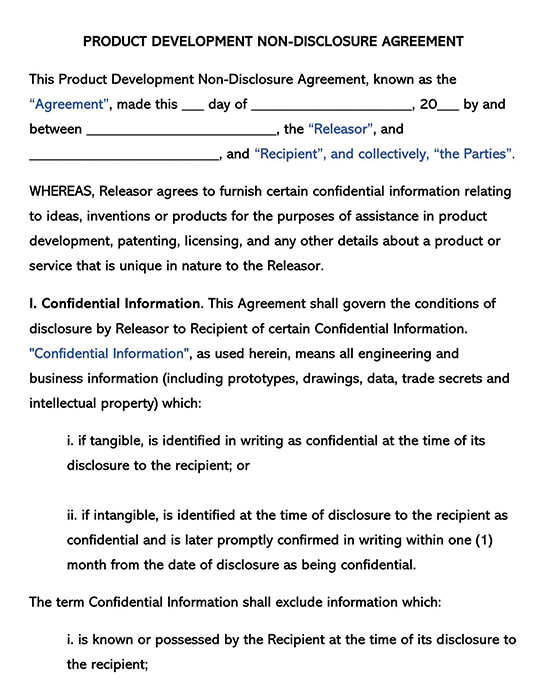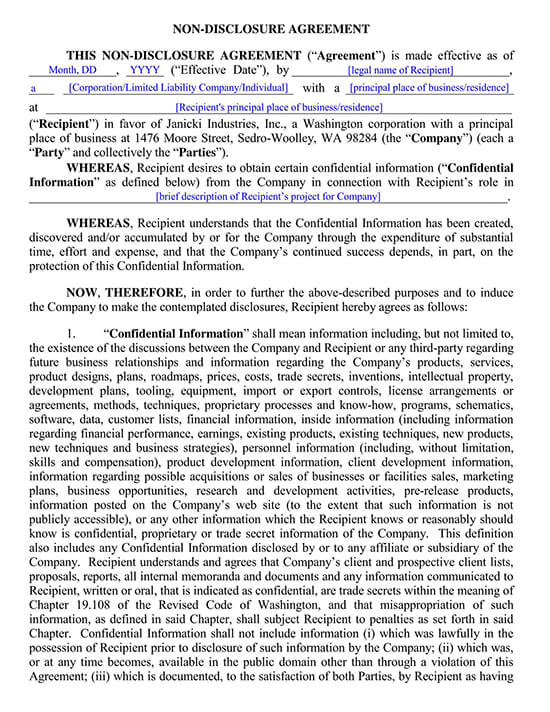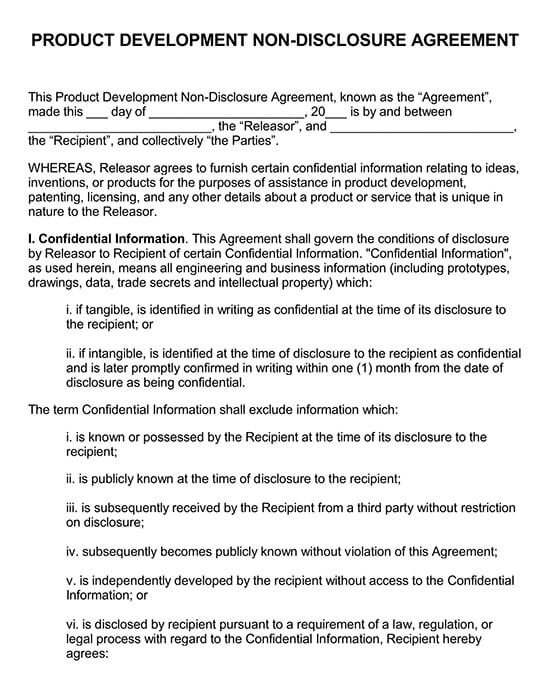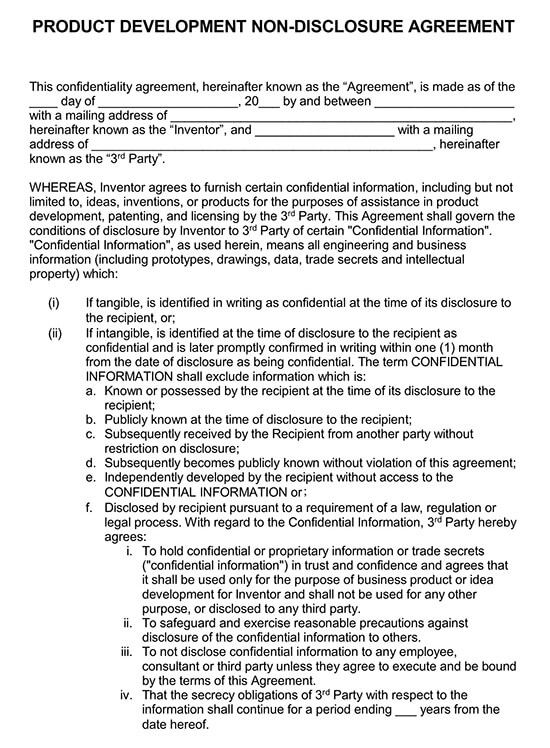More often, inventions are usually considered as the bedrock of innovation. An invention provides a new solution to a problem in our society. Unfortunately, there are times when an individual comes up with new products, but their efforts go in vain. After sharing their ideas, other parties take advantage by copying these inventions and benefiting elsewhere. Therefore, if you ever find yourself inventing a new product, it’s imperative that you sign a product development non-disclosure agreement to protect your ideas and hard work from being ruined.
Free Templates & Examples




What is the Product Development Non-Disclosure Agreement?
A Product Development Non-Disclosure Agreement (NDA) is a unilateral agreement document between an inventor and the recipient party to keep information about a newly invented product or service confidential before patenting it.
Once signed, both parties agree to avoid unpatented invention so as to avoid misappropriations and dishonesty. The main intent of the Product Development NDA is to prevent unwanted disclosure of the invention to a third party since it could affect the successful completion of the product/service in question. Also, the agreement ensures that the product inventor can only share his or her progress on the product/service invention under patent licensing so as to guarantee confidentiality.
Usually, the agreement does involve a number of steps to ensure its efficiency. These steps include the following:
- Idea generation
- Concept testing and validation
- Idea screening and marketability
- Metric evaluation and monitoring and lastly
- Commercialization and post-commercialization review.
Note that confidential information is not only concerned about the product/service under invention but also other factors that will contribute to the overall objective of the invention. As such, factors such as market studies, competitor analysis, and cost-benefit evaluations, among others, will have to be tested in order to validate the effectiveness and efficiency of the new product.
How to Write (Basic Contents)
Well, writing a Product Development NDA can be tiresome for many. Therefore, if you want a simple and quick way to get your agreement, please go ahead and download our free templates. The templates are professionally designed to make it easy and efficient for our clients to use. However, if you are thinking about writing one on your own, the following steps will help you through it.
- Introduction: In the introductory part of your Product Development NDA, you can include the details of individuals involved in the agreement. This should include their names and official addresses.
- Product development: In this section, you need to provide a brief summary of the product development process.
- Definition of confidential information: Here, you need to clearly define what is protected against disclosure. Every term needs to be defined in a simple manner that is understood by everyone.
- The obligation of receiving party: Once you’ve defined the confidential terms and information, you now need to make clear the processes that will make your engagement secretive and confidential. Plus, you should list a number of obligations or duties that the receiver of the product must undertake to ensure no information is shared, unless under your consent.
- Exclusions: This clause describes all the type of information that is not covered by the agreement. They may include exclusions made by the court decisions or state laws.
- Term: Under this section, the inventor and the product receiver should state the duration with which the agreement is valid. The duration will depend on a number of factors, such as how long both parties are willing to keep the information secret. Usually, some individuals prefer the agreement to take at most five years. However, some often take a much shorter period, while others take more than five years.
- No rights granted: This section makes it clear that while trade can occur between the involved parties, no rights of ownership of the intellectual property is granted to the receiver whatsoever.
- General provisions: This section provides other general and miscellaneous information grouped together at the end of the agreement. They may include severability, integration, waivers, injunction relief, attorney relief, and other jurisdictions.
- Sign-ups: After the general agreements have been considered, the document must be signed by the relevant persons, and a copy kept for future reference.
Frequently Asked Questions
Usually, a Product Development NDA can take between 1 to 5 years to enforce. The duration, however, is determined with a lot of factors, including the nature of transactions as well as market conditions.
A Product Development NDA is a civic contract. Therefore, if you fail to adhere to the set rules, you risk being sued for breach of contract. Additionally, you could be held liable for paying any financial damages and other related costs.
Well, just like any other contract, one can only end a Product Development NDA through the legal process. Alternatively, you can also negotiate with the responsible party should you wish to opt-out.
Yes. The product development non-disclosure agreements do work. However, you need to engage with parties with whom you have absolute trust that they can keep confidential information.












